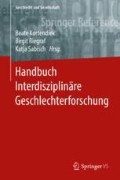Abstract
Gender research in Eastern Europe started with the transition to democracy and neoliberal market economy. The roots of this development, the pre-1989 research on social inequalities, and the import of English as a language of inquiry combined with intellectual reference points determined its institutions, outreach and impact. We can differentiate three phases of institutionalization: 1. before Eastern European countries joined the EU; 2. after the introduction of the Bologna process; 3. the post-2008 emergence of anti-gender movements that currently question the foundation, terminology, and politics of gender studies.
Access this chapter
Tax calculation will be finalised at checkout
Purchases are for personal use only
References
AtGender. 2015. Translating sex/gender. https://atgender.eu/translating-sexgender/. Last accessed 1 Oct 2017.
Boydston, Jeanne. 2008. Gender as a question of historical analysis. Gender and History 20(3): 558–583.
Braidotti, Rosi, and Garbiele Griffin, Eds. 2002. Thinking differently. A reader in European women’s studies. London/New York: Zed Books.
Davis, Kathy. 2014. Beyond the canon? Travelling theories and cultural translations. European Journal of Women’s Studies 21(3): 215–218.
Drakulić, Slavenka. 2015. How did women survive the communism (and did not laugh). Eurozine. http://www.eurozine.com/how-women-survived-post-communism-and-didnt-laugh/. Last accessed 10 Oct 2016.
Funk, Nanette. 2014. A very tangled knot: Official state socialist women’s organizations, women’s agency and feminism in eastern European state socialism. European Journal of Women’s Studies 21(4): 344–360.
Gapova, Elena, Al’mira Usmanova, and Andrea Pető, Eds. 2002. Gendernye istorii vostochnoy evropy (Gendered histories from Eastern Europe). Minsk: European Humanities University.
Ghodsee, Kristen. 2015. Untangling the knot: A response to Nanette Funk. European Journal of Women’s Studies 22(2): 248–252.
Grzebalska, Weronika. 2016. Why the war on ‘Gender Ideology’ matters – and not just to feminists. Anti-genderism and the crisis of neoliberal democracy. http://visegradinsight.eu/why-the-war-on-gender-ideology-matters-and-not-just-to-feminists/. Last accessed 10 Oct 2016.
Grzebalska, Weronika, Eszter Kováts, and Andrea Pető. 2017. Gender as symbolic glue: how ‘gender’ became an umbrella term for the rejection of the (neo)liberal order. http://politicalcritique.org/long-read/2017/gender-as-symbolic-glue-how-gender-became-an-umbrella-term-for-the-rejection-of-the-neoliberal-order/. Last accessed 1 Oct 2017.
Juhász, Borbála, Jeanette van der Sanden, Andrea Pető, and Berteke Waaldijk. 2005. Educational migration and gender: Women’s studies students’ educational mobility in Europe. In Doing women’s studies. Employment opportunities, personal impacts and social consequences, Ed. Gabriele Griffin, 186–195. London/New York: Zed Books.
Kondakov, Alexander. 2016. Teaching queer theory in Russia. QED: A Journal in GLBTQ Worldmaking 3(2): 107–118.
Kováts, Eszter, Ed. 2016. Solidarity in struggle – Feminist perspectives on neoliberalism in East-Central Europe. Budapest: FES.
Kováts, Eszter, and Maari Poim, Eds. 2015. Gender as symbolic glue. The position and role of conservative and far right parties in the anti-gender mobilisation in Europe. Brussels: FEPS, FES.
Kuhar, Roman. 2015. Playing with science: Sexual citizenship and the Roman Catholic Church counter-narratives in Slovenia and Croatia. Women’s Studies International Forum 49: 84–92.
Liljeström, Marianne. 2016. Constructing the West/Nordic: The rise of Gender Studies in Russia. In The geopolitics of Nordic and Russian gender research 1975–2005, Eds. Ulrika Dahl, Marianne Liljeström, and Ulla Söderthörn, 133–175. Stockholm: Södertörns högskola.
Lykke, Nina. 2004. Between particularism, universalism and transversalism. Reflections on the politics of location of European feminist research and education. Nora. Nordic Journal of Feminist and Gender Research 12(2): 72–82.
Nikolchina, Miglena. 2002. The seminar: ‘Mode d’emploi’ impure spaces in the light of late totalitarianism. differences. A Journal of Feminist Cultural Studies 13(1): 96–127.
Oates-Indruchova, Libora. 2016. Unrevealing a tradition, or spinning a myth? Gender critique in Czech society and culture. Slavic Review 75(4): 919–943.
Pető, Andrea, Ed. 2006. Teaching Gender Studies in Hungary – A társadalmi nemek oktatása Magyarországon. Budapest: ISZCSEM.
Pető, Andrea. 2015. After „emancipation after emancipation”. On Europe’s Anti-gender movements. Eurozine. http://www.eurozine.com/after-emancipation-after-emancipation/. Last accessed 1 Oct 2017.
Pető, Andrea. 2017a. How are Anti-Gender movements changing Gender Studies as a profession? Religion and Gender 6(2): 297–299.
Pető, Andrea. 2017b. Report from the trenches. The debate around teaching gender studies in Hungary. https://www.boell.de/en/2017/04/10/report-trenches-debate-around-teaching-gender-studies-hungary. Last accessed 1 Oct 2017.
Šmejkalova, Jirina. 1996. On the road: Smuggling feminism across the post-iron curtain. http://www.c3.hu/scripta/replika/english/01/10fsmej.htm. Last accessed 1 Oct 2017.
Tuning. 2010. Tuning educational structures in Europe. Reference points for design and delivery of degree programs in Gender Studies. http://tuningacademy.org/wp-content/uploads/2014/02/RefGender-Studies_EU_EN.pdf. Last accessed 4 Oct 2017.
Author information
Authors and Affiliations
Corresponding author
Editor information
Editors and Affiliations
Rights and permissions
Copyright information
© 2019 Springer Fachmedien Wiesbaden GmbH, ein Teil von Springer Nature
About this chapter
Cite this chapter
Pető, A. (2019). Eastern Europe: Gender Research, Knowledge Production and Institutions. In: Kortendiek, B., Riegraf, B., Sabisch, K. (eds) Handbuch Interdisziplinäre Geschlechterforschung. Geschlecht und Gesellschaft, vol 65. Springer VS, Wiesbaden. https://doi.org/10.1007/978-3-658-12496-0_153
Download citation
DOI: https://doi.org/10.1007/978-3-658-12496-0_153
Published:
Publisher Name: Springer VS, Wiesbaden
Print ISBN: 978-3-658-12495-3
Online ISBN: 978-3-658-12496-0
eBook Packages: Social Science and Law (German Language)

